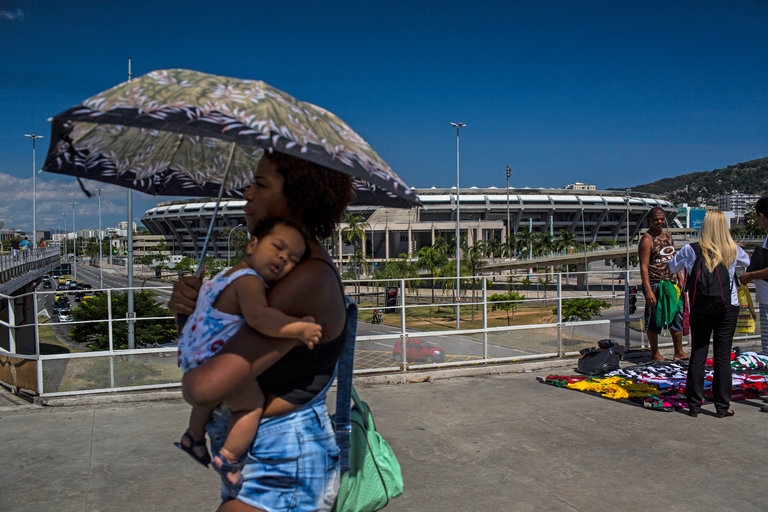
Outside the damaged and abandoned Maracanã Stadium in Rio de Janeiro this month. Credit: Dado Galdieri for The New York Times
The New York Times
February 19, 2017
by Vanessa Barbara
Contributing opinion writer
SÃO PAULO, Brazil — As many as 70 towns and cities around Brazil are reported to have canceled Carnival festivities this year because they are suffering from the worst recession in the country’s recent history.
The mayor of Taquari, in Rio Grande do Sul, has decided to use the money that would have gone to the celebrations to speed up the waiting line for health exams in public hospitals, as well as to fund a project for children with special needs. Last year, the city of Guaraí, in Tocantins, canceled New Year festivities to renovate two public schools, while in Porto Ferreira, a small town in São Paulo State, the local assembly voted to call off Carnival and use the money to buy a new ambulance.
But this is not a moralistic fable about the lavish waste of funds and the duty of helping poor children instead of partying in a giant baby costume. I just find it remarkable that, amid our national recession, the region that seems to be in the worst shape is Rio de Janeiro, where the Olympics took place last year with great buzz and, the government said, a priceless surge in tourists.
Now both the city and the state of Rio are in trouble. The new mayor is projecting an almost $1 billion budget shortfall this year, and the state budget is expected to fall more than $6 billion short. The state also owes $10 billion in loans guaranteed by the federal government.
Around two years ago, the state government started delaying civil servants’ salaries and pension checks. Right now public employees, such as professors from the State University of Rio de Janeiro, are still receiving part of their wages for December, with no expectations for a year-end bonus. There are many reports of state employees who don’t have enough money to pay rent or buy food. For a while now, state hospitals have been unable to afford equipment, supplies and salaries. The education budget has also been slashed. Even police officers and firefighters have threatened to strike over late paychecks.
The budget disaster in Rio could be attributed to many factors, such as the fall in the oil prices, the expansion of the government payroll and the general recession. But there’s no doubt that reckless spending on the World Cup and the Olympics played a role. The city of Rio will be paying off the debts it amassed for years, while it also now has to maintain the arenas it built.
As a result of all this, Rio’s governor is trying to pass more than 20 austerity measures. He seems to have decided that the population had effectively joined the party and now wants to split the cost of the beer. The measures include salary reductions and higher social security payments for civil servants, tax hikes, an increase in public transportation fees and the end of many social programs such as rental subsidies for the homeless. The state has also signaled it will sell off the public water supply and sanitation department to private investors.
Meanwhile, it keeps granting significant tax exemptions to telephone companies and other businesses. According to a report from the Agência Pública, a Brazilian investigative journalism agency, just 50 companies received $8 billion of tax exemptions between 2007 and 2010. They include luxury jewelry brands, beauty salons and massage parlors. Others are online retailers that barely generate jobs. The suspicion is that these companies have given big donations to political campaigns. The Federal Public Prosecutor’s Office is investigating whether some of the tax exemptions given to jewelry companies were related to money laundering.
Naturally, Cariocas — the residents of Rio — are taking to the streets in protest and are being received by the police with the customary niceties. In December, police officers entered a church near the state legislative building and shot rubber bullets at rioters from a window. (Their paychecks are also overdue.) Early this month a bus was set on fire and exploded downtown. On the same day, a civilian police officer fired at the military riot police during a protest. Sanitation workers are on strike. More rallies are scheduled for the next weeks. On Tuesday, 9,000 army soldiers were deployed to patrol the streets of Rio, where they could remain until March.
In addition to this uproar in the streets, a few months ago, two former governors of the state of Rio were arrested on corruption and voter fraud charges. Anthony Garotinho is suspected of attempted vote rigging, and Sergio Cabral, whose term ended in 2014, is accused of demanding $64 million in bribes in return for infrastructure contracts for World Cup and other projects.
Just six months after the mega-event, the Barra Olympic Park looks like a ghost town; visitors say that the pool is filled with mud. Maracanã Stadium is damaged and completely abandoned. The Radical Park of Deodoro Sports Complex, whose swimming pool and grounds were supposed to remain open to the public, is closed. Guanabara Bay, where sailing and windsurfing events were held during the Games, is still polluted. The Olympic euphoria is definitely gone, as pensions and salaries are held up indefinitely and police officers fight against one another in the streets.
But tourists should not worry: Rio’s Carnival is still guaranteed.
An earlier version of this article included outdated information about Brazilian cities canceling Carnival. This year, estimates of the number of cities deciding to not mount Carnival festivities are as high as 70; a reference to 48 cities doing so reflected the situation in 2016. The essay also misstated the year the city of Porto Ferreira opted to buy an ambulance instead of holding Carnival. It was 2016, not this year.

